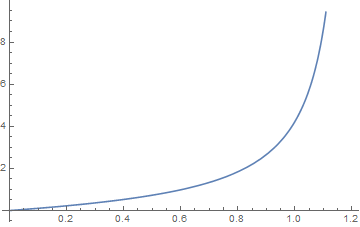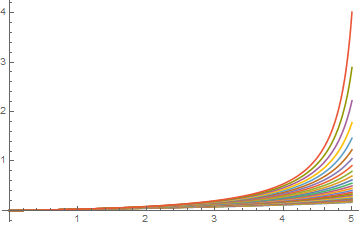I'm pasting a code of a DE.I'm getting error. Plz suggest correction.
Clear[x];
r=1;
eqn=x'[t]-1-r*x[t]-(x^2)[t];
sol=NDSolve[{eqn,x[0]==0},x,{t,0,100}][[1]];
tTicks=Range[-24,24 30,24];
tGrid=Range[-60,24 30,6];
ParametricPlot[Evaluate[{x[t],x'[t]}/.sol],{t,0,100},Frame->True,FrameTicks->{tTicks,Automatic},FrameTicksStyle->Directive[Red,Thick],GridLines->{tGrid,Automatic},GridLinesStyle->LightGray,FrameLabel->(Style[#,14,Bold]&/@{x,Overscript[x,"."]}),AspectRatio->1]
ParametricPlot[Evaluate[{t,x[t]/.sol}],{t,0,50},Frame->True,FrameTicks->{Range[0,50,12],Automatic},FrameTicksStyle->Directive[Red,Thick],GridLines->{tGrid,Automatic},GridLinesStyle->LightGray,FrameLabel->(Style[#,14,Bold]&/@{t,x}),AspectRatio->1]
I made the correction regarding the syntax error. But still no execution.
The following code,
Clear[x];
r=1;
eqn=x'[t]-1-r*x[t]-x[t]^2==0;sol=NDSolve[{eqn,x[0]==0},x,{t,0,100}][[1]];
tTicks=Range[-24,24 30,24];
tGrid=Range[-60,24 30,6];
ParametricPlot[Evaluate[{x[t],x'[t]}/.sol],{t,0,100},Frame->True,FrameTicks->{tTicks,Automatic},FrameTicksStyle->Directive[Red,Thick],GridLines->{tGrid,Automatic},GridLinesStyle->LightGray,FrameLabel->(Style[#,14,Bold]&/@{x,Overscript[x,"."]}),AspectRatio->1]
ParametricPlot[Evaluate[{t,x[t]/.sol}],{t,0,50},Frame->True,FrameTicks->{Range[0,50,12],Automatic},FrameTicksStyle->Directive[Red,Thick],GridLines->{tGrid,Automatic},GridLinesStyle->LightGray,FrameLabel->(Style[#,14,Bold]&/@{t,x}),AspectRatio->1]
Giving me the errors
NDSolve::dvnoarg: The function x appears with no arguments. >>
ReplaceAll::reps: {-x[t]^2+(x^2)[t]==0,x[0]==0} is neither a list of replacement rules nor a valid dispatch table, and so cannot be used for replacing. >>
ReplaceAll::reps: {-x[0.00204082]^2+(x^2)[0.00204082]==0,x[0]==0} is neither a list of replacement rules nor a valid dispatch table, and so cannot be used for replacing. >>
ReplaceAll::reps: {-1. x[0.00204082]^2+(x^2)[0.00204082]==0.,x[0.]==0.} is neither a list of replacement rules nor a valid dispatch table, and so cannot be used for replacing. >>
General::stop: Further output of ReplaceAll::reps will be suppressed during this calculation. >>
Regards



NDSolve? If it is, the rest of the info is extraneous. Is it in theParametricPlot? Then perhaps remove all of the unnecessary formatting options which are most likely irrelevant. Also, please edit your post so that the code are in code blocks: clock the grey question mark on the far right of the toolbar when editing your post for help. Edit: the error that you get tells you exactly what the problem is. Replaceeqnwitheqn==0insideNDSolve. Secondly, you have some syntax errors:(x^2)[t]should bex[t]^2. $\endgroup$